#cultural things without knowing why they’re so ingrained in you…..
Explore tagged Tumblr posts
Text
i think about siffrin knowing how to wish properly from the start all the time cause like. i know theres so many things about him just like that. things he does learned from his culture that now he doesn’t have any reason behind it bc he can’t remember. its so. ougfjvhjdsbk
#mono’s stuff#isat spoilers#cultural things without knowing why they’re so ingrained in you…..#doing things on instinct that get him weird looks and people will ask “where are you from? is it common there?” and he can’t answer…#yk…..#do you think he sees food like malanga fritters but butchered horribly and he KNOWS its wrong and not his traditional way and makes a face#and when he’s asked about it he can’t even say what the right way is he just knows it’s Wrong. to him at least
28 notes
·
View notes
Note
NPD culture is everything is a competition, and I must always win, and then I will shove it in other people’s faces to make them regret having ever doubted me. I am constantly comparing myself to others because I don’t know what else to compare myself to. I have no other way of knowing/understanding myself, let alone making goals and motivations without a “reference”. Of course I’ll act like I wasn’t trying if I come short of perfection in a competition though. I’m always told something “isn’t a competition”, but how do they know that? The prize isn’t tangible, so they wouldn’t understand. They don’t understand what it’s like to have to earn love and respect, to work for affection and to be seen as “equal”. No matter how hard I worked it was never enough, so now that has been ingrained into my psyche. I will compete with anyone—strangers, friends, family. I cannot maintain relationships when I am so focused on proving my worth and searching for perceived attacks and insults, when I already assume the other person is out to get me and sees me as inferior, when I don’t even know what love and acceptance is supposed to look like. You get so used to dysfunctional relationships that a healthy one feels foreign and intimidating, because you can’t predict what will happen. Genuine compassion feels like a personal attack or like they’re secretly trying to degrade me; they could genuinely mean it, but I have been conditioned to assume that everything is a threat. Maybe it’s because it makes me feel vulnerable; if people praise my persona I’ve made, then I feel empty, but if people praise the real me, I feel aggressive and humiliated. I can’t stand anyone seeing who I actually am, even if they are willing to extend praise and acceptance; I have not come to love and accept myself, so why should they? I try to be vulnerable, but it feels like my brain physically holds me back sometimes, like it’s trying to protect me from the humiliation and pain I went through. It feels like no matter what I do the praise I receive feels empty and disingenuous. Everything I do is compensation for the fact that I hate myself.
Of course, as a disclaimer, these are just thoughts I have and I don’t say these out loud:
Exhibit A: Oh, you make art? So do I, here are all the mistakes I found as well as reasons why I’m better and more skilled.
Exhibit B: You dressed up today? Well, here are all the things you did incorrectly—not me being nit-picky, just thought I’d let you know (because I have so much knowledge).
Exhibit C: Those are your headcanons of a character (that I also happen to like)? Here are all the reasons they are wrong and would never happen and mine are better because I have such an amazing understanding and connection to this character. (Hiss hiss my territory back off).
.
31 notes
·
View notes
Note
I’m all for chappel standing up for herself and not letting anyone walk all over her, but her whole attitude toward fame really just irks me lmfao. Her saying “This fame crap.” At the VMAS and “I don’t want to win a grammy.” just feels so ungrateful to me and tbh a bit bitchy (I know that was an old statement but still). I get being overwhelmed by bad interactions, and she has EVERY right to be, but jesus christ why complain about the career you are actively pursuing on a red carpet? Like girl if you REALLY don’t care that much let someone else do it who WANTS to? I know she blew up overnight. I know she’s probably very overwhelmed but fuck, her whole attitude is like a high schooler trying to pretend she’s too good for everything. It’s off putting and leaves a bad taste in my mouth.
So I think a number of things can be true at the same time. She's right and she should say it, but the way she's going about it probably isn't the most strategic move she could be making in terms of her public image, and at the same time, there's no such thing as a perfect victim, so I don't think there's any way she could have asserted herself that would have been universally applauded.
As I've said on here before (here and here), I do think that fundamentally, Chappell is right. Especially in countries that have deeply ingrained stan cultures, as the US does, the relationship between celebrities and the public is kind of abusive. We’re putting these celebrities in gilded cages and expecting them to dance on command, as if they’re objects instead of people. Chappell should have the right to be an artist without being harassed every time she goes out in public and without her friends and family being stalked. I think it's really weird that we act like this treatment is acceptable for artists when it would be totally unacceptable to do to like, the barista at your coffee shop. I think she has a right to pursue professional opportunities (award shows, interviews) without also agreeing to interactions with fans in non-professional contexts, when she's not "on the clock". I don't think that's inherently contradictory. It's reasonable for her to want a work-life balance, especially since she's someone who is playing a character when on stage. I also want to point out that we don't know how much control she actually has over these public appearances. Her label may have committed her to interviews and award shows without asking her permission, or there may be a reason why she couldn't pull out of those obligations even if she wanted to.
That said, from a PR perspective, I think she should have stopped while she was ahead. Instead of posting raw TikTok videos and then continuing to double down, it probably would have been more strategic for her to work with her team to craft one single statement, and then to reiterate those same points whenever the topic comes up in an interview or other public space. The way that she's been talking about it seems like it's eroding the good will she has with the public, and, as you say, the narrative is starting to become that she's bitchy and ungrateful. I think her team should be doing a better job managing her public image and guiding her in the right direction, since they're the professionals and she's really new at this.
But that said, Chappell is an introverted 26 year old girl who struggles with bipolar disorder and only blew up five months ago. Of course she's struggling with this. Touring is grueling even for people who are really mentally healthy. It's overwhelming and exhausting and all of your routines get upended. There's an interview where she says that, "this industry and artistry fucking thrive on mental illness, burnout, overworking yourself, overextending yourself, not sleeping. You get bigger the more unhealthy you are. Isn’t that so fucked up?”, and I think that's really true. And so for people who struggle with a mental illness, touring is that much harder, and can really exacerbate their symptoms.
Plus, for someone like Chappell, who describes herself as very introverted, I think touring must be especially hard because you're essentially with your coworkers all day, every day. There's this one Vanity Fair interview that she did before Rise and Fall of A Midwest Princess came out where she says that, "I found it to be pretty exhausting just interacting with so many people a night. Not anything they did wrong, but my soul was just so overwhelmed. Shows really take it out of you. It's a really emotional rollercoaster being on tour, so it's hard to play the character [of Chappell Roan] all the time." She also says that, "finally I found a place that I feel good about my meds. I'm in therapy. I really try to like, take care of myself. But, oh my god, it's so hard with this job because there's no checking out. There's no clocking in and out. I worked at a doughnut shop for a long time and I loved it because I would just leave work and I would just go watch TV and it was great. But I feel like this is just really hard to take a step away from, especially on tour."
In that context, where she's gone from being virtually unknown to not being able to go out in public without being recognized, where she, her family, and her friends are being stalked, where lots of people have an opinion on her as a publicly queer woman, where she's been touring for months on end, where she's maybe not able to take care of her mental health as well as she could at home, I think it makes a lot of sense that she's in a place of being burnt out and not quite knowing how to handle it.
To me, it seems like she's going through a very human emotion of wanting to set boundaries but not wanting to lose the fans and support she has and not knowing how to find that balance. I think especially for someone who (from what she's said) has felt ostracized and different her entire life, the idea of losing the huge amount of appreciation and support she now has is probably terrifying. She's said that this project is about "honouring the childhood I never got" and so I think it makes sense that she's both fiercely protective of it and not ready to let it go.
I've also seen a lot of people say that she should just cancel all further appearances and disappear from the spotlight for a while, but I don't actually know if she can do that. She's not really in a position like Lorde or Enya where she could just go home and everyone would treat her the way they used to. She's from a small town in Missouri where everyone knows her and I imagine, a lot of people have negative opinions about her, and now she lives in LA where everyone knows who she is. I think she would have to start over somewhere totally new, in the middle of nowhere, with no queer community and away from her family and friends. I get why she might feel like that's not really an option.
I think ultimately what she wants is for people to view "Chappell" and "Kayleigh" as two totally different entities, where Chappell is a celebrity but Kayleigh isn't. And I think that's a totally fair thing to want, especially because Chappell is a very easily identifiable character, so it's easy to know when she's "at work" and when she's "off the clock". I think it's super reasonable for her to want to do the things she loves to do- make music, perform, play the character of Chappell on stage- while also having a private life. I think she does really want this career as a pop star. But I don't think she wants the career of "celebrity" and I don't think she's actively trying to pursue that (beyond what her label is obligating her to do).
The last thing I want to say is that I think, as is typical for the internet, a lot of her statements are being taken out of context. For example, the Grammy's thing she said was, "my mom would love to go to the Grammys or the Brits... but I’m kind of hoping I don’t win, because then everyone will get off my ass: ‘See guys, we did it and we didn’t win, bye’! I won’t have to do this again!” I think what she's talking about is the process of campaigning for a Grammy. Those awards don't just go to the artists who are the "best" in some kind of objective way. Labels campaign hard for those awards, which means that their artists also have to campaign hard for the award, whether that's something they really want to do or not. So I think she's saying "if I lose, we won't have to do the campaigning for this award the next time I put an album out," not "I don't appreciate the recognition and appreciation I'm getting." In general, I would really recommend reading that entire interview, because it gives good insight into where her thinking is right now, where she is emotionally, and what these interactions that she's talking about are actually like.
I'm sure I'm forgetting something I wanted to say about this, but I guess all I'm really trying to say is that I think Chappell (and all celebrities) are put in a really difficult situation, and I don't blame her for not being able to handle it perfectly. I think her team should be doing more to shield her from some of this and to protect her image so that she doesn't have to deal with people hating her on top of dealing with the people who love her too much.
4 notes
·
View notes
Note
I want to make my relationship w food better but it’s hard bc of my parents are so ingrained in diet culture. Like for example I try to explain to them that carbs are not bad for u but then they say they’re on the border of diabetes and my dads doctor told him to limit the carbs and that I should be careful too like I don’t even know what to do
Hi anon! That does sound tough. So this is complicated by their health issues. I always say "food has no morality" because a lot of people do assign blanket "guilt" or "badness" to certain foods. And while carbs, for example, are not inherently bad for everyone, some people do have medical issues that cause them to change their diets to meet their medical needs. That doesn't make the foods they eschew "bad." It just means that everyone has different needs!
For example, gluten! Gluten became a big buzzword in the past ten years or so, and a lot of people inherently assume that it is poison and that life is healthier without it. That leads to a lot of guilt around eating what has been a staple crop in many cultures' diets for thousands and thousands of years!
Unless, of course, you have celiac disease. If you have celiac disease, gluten WILL poison your body, and you WILL be much healthier if you never eat it again. But for everyone else, treating gluten that way can cause a great deal of harm and stress.
So it is true that for certain types of diabetes, a high-carb diet will worsen symptoms, and carefully measuring carbs will help to keep symptoms in check. (That is why it's so hard to keep a healthy relationship with food when you have a pre-existing health condition, unfortunately. It's very hard, emotionally and socially, when your body inherently treats delicious cultural staples as the enemy.)
However, this is only true of your parents and their pre-diabetic symptoms, and only if they've been working with a doctor! Carbs are not inherently bad for anyone else, and if you're not diabetic or in the pre-diabetic stages, then carbs are not at all bad for you! You can only get diagnosed by a doctor, so you don't necessarily have to take your parents' advice unless a doctor concludes through testing that you are also at risk for developing diabetes. It's understandable that they are very worried about their health if they're at risk for diabetes, and worried for yours too. And they're working based on the instinct that what's good for them must be good for you. But I imagine it's triggering hearing them talk about it so much, especially when they try to push it onto you.
I'm sorry to hear that this has been such an issue in your home. Do you think that your parents would be open to hearing about how much it stresses you to hear them talk about carbs because you struggle with your relationship with food? Do you think you'd be able to work with them on boundaries regarding recommending you diets? If not, your best bet may be to take space when triggered, to breathe, and remind yourself that all bodies have different needs and that carbs are not inherently "evil" and are, in fact, a necessary nutrient. It's just that different bodies need different amounts of them depending on various factors. Try repeating things of this nature that calm you, and remind yourself that if you're not noticing any health symptoms that you would need to take up with a doctor, then it's absolutely not necessary to restrict anything you've been eating.
7 notes
·
View notes
Text
i didnt expect this post to get notes but i wanted to expand on my thoughts on all this a little bit.
in recent years ive seen a huge rise in purity culture disguised as feminism. and it fundamentally misunderstands what the patriarchal standard of sexuality for women actually is. the patriarchy does not just want women to have sex with men. it wants women to be sexually malleable. the patriarchal standard is not to be sexy, its to be passive. you may only be sexy if instructed to by a man. you will not be sexual of your own accord.
a woman who knows herself as a sexual being, who has the agency to explore her own desires and boundaries, is actively repulsive the patriarchy. theres a reason every misogynistic man is obsessed with body counts and very very young women. they cannot bear the thought of having sex with a woman who has experience or standards or expectations. the most desirable thing in the world to them is a woman with no knowledge and no agency.
this is why many men will see an attractive woman, desire her, and become angry when she still exists in public as an attractive woman once they are in a relationship. he assumed without a single doubt that her attractiveness was FOR HIM. she was a product advertising her features, he bought her, and now that he owns her, he doesnt want anyone else to share his possession.
all this is to say, women who acknowledge themselves as the sole owners of their sexuality, are not a product of the patriarchy. they are not catering to misogynistic men, they are not trad wife propaganda. in my experience, they are actively good for women. bear with me.
from my personal experience, i think a lot of women who call any female sexuality degrading are not really having in depth conversations with women who have sex with men. they are not talking to their friends and mothers and grandmothers or any of the regular-private-citizen women around them about what their experiences with sex actually are. but im a neurodivergent woman with a special interest in sex, and i will absolutely talk about it.
i wanna clarify that im a feminine woman who has been in a relationship with a masculine man for 12 years. we are “school sweethearts”, we own a house together. we are both bisexual..but we’re not stupid, we know full well that most people see us as some kind of heterosexual goal. this combined with my willingness to talk openly about sex has made me somewhat of a safe space for other women who have relationships with men.
i cannot fucking believe i am doing a “let women be straight” here but in discussions of patriarchy, we do have to acknowledge that many women are going to be horny, and they’re going to be horny over men. we cannot responsibly say that women having sex with men is degrading and just draw a line under that. we know full well that the abstinence-only approach does fuck all for anyone. education and open discussion is a powerful tool against oppression. people are going to fuck, so we NEED to give them the tools to do so in a way that is healthy and positive for them.
to be quite honest i dont think people who have issues with candid discussion of sex are really understanding..the situation. girl, so many women are scared of their own desires and vaginas. some of them have never considered the fact that they can derive their own pleasure from sex, that there is more to be had than just the satisfaction of doing someone a favour. thats how a lot of them are having sex by the way. it is something men are doing TO them, not something they are active participants in. the enjoyment they have been socialised to believe is the only acceptable form of desire, is not sexual or physical, its in the act of allowing a man to get his own pleasure. we’re taught that the best thing we can be is selfless.
the women i have spoken to have such an ingrained puritanical belief that to be a woman and to engage with any kind of sexual content is to be tainted. im not talking about overtly erotic media here, im talking about educational resources. there is shame about learning their own anatomy. one of my best friends will not go to the gynaecologist because she cannot get over the idea that it is an inherently sexual and therefore dirty act for someone to see her vulva. her shame is preventing her from accessing medical care. it fucking breaks my heart to see a woman i love so much struggle like this.
and this is the main emotion i feel when having these conversations. straight up despair. women who dont know that sex isnt supposed to hurt, women who dont know they are supposed to feel safe with the person they’re having sex with, women who have never experienced an orgasm, women who didnt know there exists sex other than penetration, sex that acknowledges a woman’s body, not just a mans penis. what the fuck are we doing? as a culture we do need to make space for women’s desire. yes, women having sex with men has always been normalised, but women exercising sexual agency with men has almost never been accepted. marital rape is a very new concept in our culture. despair.
i have spoken to women who are shocked that my male partner cares about me in any way. shocked that my experience of the sex we have is a priority for him. shocked that we will have long serious discussions about sex that are not erotic in themselves (i.e. not dirty talk). shocked that in 12 years he has never treated my body as an object that exists for his pleasure. shocked that he fully respects and actively seeks out the agency i have over my body and sexuality. he doesnt WANT to do something unless he knows i genuinely desire it.
he and i both know that he doesnt get props for this. he knows he’s not doing some incredible act me here. he’s just treating me like a person. he has said that being complimented for treating me with respect feels like being complimented for not deliberately running down pedestrians with his car. “wow its so cool that you didnt do something horrifying!” what would be the alternative?
to some of these women, im the first person to communicate any of this. was it not for my exercising my own agency to have healthy sex and subsequently discuss said healthy sex, these women would perhaps have continued to think that the only form of female sexuality is the passivity that we are socialised into. im teaching these women about informed consent, about vaginismus, about STI testing, about vaginal arousal, about clitoral stimulation, about personal satisfaction, about safety, about FUN. if i believed, through “progressive” neopuritanism or regular old conservative repression, that my desires were dirty, that the sex i had was degrading, that its good for women to hide the fact that we can be sexual, who would have talked to my friends about these things?
and this is where i loop back to the the struggle people have with the difference between objectification and sexual agency. i dont think as a society we really have much of a reference for what female sexual satisfaction actually IS. if every time an adult woman in the spotlight expresses her sexuality we say she’s setting women back 100 years, if we can only see sexual women as degraded, then have we not normalised the idea that sex inherently leads to feelings of degradation? normalised sexual shame and guilt? by doing this we rob women of any reference to healthy sexuality that they can aspire to. we teach them that their sexual desire is essentially synonymous with the feelings one might feel after actually being exploited/abused/assaulted by a man. how then, will she know the difference?
i have a post sitting in my drafts about how i find the concept of sexual repression to be genuinely eerie, because if you feel guilt and disgust for having healthy consensual sex, how can you differentiate between that and unhealthy/harmful sex? when i have sex with my partner, i feel so positive. i feel joy. its fun and beautiful and wonderful. if we had sex and i started to feel shame or guilt, i would immediately know that something was off. i would stop what is happening, i would check in with myself and with my partner, we would have a good hard look at what happened. this ability for emotional discernment keeps us safe.
we should not be desensitising anyone to the genuine objectification and degradation of women by crying wolf every time a woman openly loves her body and her sexuality. if you see a woman in a skimpy outfit and decide she is objectifying herself, i beg you to question what part of her personhood she had to remove to wear her outfit. question whether place that her personhood was removed, was in your own head.
truly, women are not responsible for the abuse we face at the hands of men. if all women became perfectly chaste and dressed conservatively tomorrow, people would still be exploited and raped and abused. if a man takes one woman’s consent as all women’s consent, you will never make him a safe person by policing the women around him. you cannot enforce any standard of sexuality that all women will be happy with. people need to learn that women are not a monolith, we are whole human beings who need agency over our own lives. we need to give women the education and tools to set their own standards, and the safety to come forward, without the deterrent of societal shame, in the event that they are exploited. passivity is dangerous.
i dont really know how to eloquently end all this. i am typing with tears in my eyes. god, i just want people to know how to keep themselves safe. im not fucking speaking in hypotheticals, these women i love have looked in my eyes and told me all sorts of trauma that they were hesitant to even call trauma. how can we solve any of these problems when we live in a culture that cannot for 5 minutes drop the repression and purity that nurtures abuse and exploitation? pushed by people who claim to care, no less? despair.
the fact that a lot of progressive people truly cannot tell the difference between a woman who is sexually objectified, and a woman who is an active sexual participant is bad bad bad bad bad bad bad
13K notes
·
View notes
Note
Harry never had a “wild period of drinking” let’s be fucking real lol. He got blackout drunk while out clubbing here and there when he was 19, like almost all 19 year olds I’ve ever met who have newfound freedom to drink and don’t know how to handle their liquor.
We’ve never seen him day drinking aside from like, a glass of wine at lunch (did we ever see that? Idk, I’m assuming cause he spent so much time in Italy). He drinks socially of course, and he has the habit of getting a little tipsy at the Brits (not other award ceremonies that I can tell, but yes at the Brits, where, to be fair, most people get drunk lol). But aside from that, he has a very profesh approach to his career, so he doesn’t drink while he tours. He has also said that if you’re drinking because you’re sad or because of any negative emotion, then you… shouldn’t (he actually said if you do drugs for that reason then you shouldn’t even drink alcohol).
That said, I think it’s pretty ingrained in British culture to drink socially. I don’t know that it’s ingrained to get blackout drunk daily. It’s perhaps more normalized than in America to consume more alcohol. But of course there are exceptions. Those exceptions don’t change the general rule. That’s why they’re exceptions. Perhaps Harry would be more prone to alcohol if he wasn’t in the spotlight and if he didn’t feel like he had to be so mindful. In fact, as careful and as not really that alcohol prone as he is, he can still drink straight tequila with a straight face and I think that tells you exactly how normalized alcohol is in British culture, that one of the examples for less alcohol consumption can basically drink poison without flinching.
Look lol Harry doesn’t drink much because he cares about his health. He got famous at 16, he did drink and does drink, but he’s very concerned about his health. Always has been. Would be weird of him to do all his juices and yoga and meditation and then like drink two bottles of wine every day? He obviously drinks but it’s a fun thing for him lol like it’s not a daily occurrence. Obviously he can do a tequila (or five) though because he has… lived a life. But that’s not his go to randomly. Idk. Also alcohol is normalized in all western cultures imo, it’s not just Brits/Irish people or anything. Harry CAN drink and enjoys it now and then but he’s anxious as a person and is very concerned about his body and health and feeling good as a person.
0 notes
Text
Saw a really shitty post today about how fanfic writing shouldn’t be taught in school because it’s ‘just paint by numbers’ as if all a fanfic author has to do is fill in a fucking Mad Libs sheet.
So I’m here to be a little angry about it!
Fanfiction absolutely SHOULD be taught as some part of creative writing classes (which let’s be real, is creative writing even a standard class in middle/high school anymore? probably not). This isn’t to say it should REPLACE anything, but rather that it has intrinsic value as a form of writing, and deserves to be exposed and discussed as one of the tools and styles a writer has in their inventory of skills, as well as discussed with regards to its prevalence in the wider culture of story telling.
Why?
Because fanfiction is actually really fucking common in so-called “original” fiction, and it works in a way completely different than original fiction, which means the skills involved in making it are not quite the same, either. And those skills have VALUE.
Think about all of the remakes of stories people have told over the years; every single AU rendition of plays written by Shakespeare aren’t The Original Play. Think of how many times Romeo and Juliet has played out in various media, without being word-for-word performances in Original Garb on a stage! That’s a modern AU, baby! Think about all the sequels to or spinoffs of stories that aren’t written by the original creator- technically those are just canon compliant stories, or canon divergences someone has permission to write. They’re what happens when someone gets paid to ask “think about this story someone else wrote, and tell me what happens next.” Think about “reboots” of media- things like Star Trek 2009, which wasn’t written by Gene Roddenberry- it’s an alternate timeline AU. Think about all the various versions of something like Sherlock- the original author didn’t write any of those. Just because it’s public domain now doesn’t mean all of the various media created with those characters aren’t fanfiction. They are! They technically are!! Think about the new set of movies being created where a common story is being told from the villain’s POV, like Maleficent! That shit’s fanfiction, too!!
Fanfiction is already deeply ingrained in our media, it’s just not called that. The difference is the amount of money and the permission involved. That’s it!
So yes!! we should!! be teaching kids!!! about fanfiction!! It is useful knowledge!! It is ABSOLUTELY worthwhile to show kids that a story doesn’t have to be 100% unique to be worth telling. There are only a handful of stories, at the core of them, that are ever told- what matters is how you tell it. What matters is THAT you tell it, rather than getting snagged on the concern that you must tell a story no one else has told before. Even if all a teacher does is teach kids that fanfiction exists and what it is, that’s worthwhile knowledge for kids to have, to know that it is an option!
And aside from that aspect, I mentioned the skills- I’m not talking about college here (although I think it has a place at least in discussion there, as well), I’m talking about actual children here. Middle school, high school maybe. Children who OFTEN have less than 1 hour in a classroom to perform exercises and learn about how to write stories while they’re also having 5+ other subjects crammed down their throats and homework and other stuff taking up their time. They know nothing! They are babies and they have a lot going on!! Are you going to tell me that it’s better to expect literal children to perform all of the complex tasks that go into creating a group of characters, their motivations, the settings, the plotline, etc all at once in a short amount of time, when so many grown ass adults have trouble with doing that on a much more relaxed scale? Well you’re wrong!!
Because you know what’s easier than expecting kids to take a small slice of time and do all the work to create entirely from scratch? Asking kids to take something they’re already excited about, and look at it in a fresh light. Hey kids, those characters you like, put them into a storyline you invent. Hey kids, you know that world you really enjoyed? Imagine some original characters in that world, and write a little story about it. You know that storyline you really liked? Make up some characters and a setting to tell that storyline in your own way. You know this story we read? Write that from a different character’s POV (which teaches people how to consider side characters as whole characters, not props!!).
Let them have fun!! Let them get excited about writing so that they keep doing it!! They have an entire lifetime ahead of them to learn how to put together all of the parts into one whole, original piece, if that’s even what they want to do. That should even be part of the class, saying okay, we wrote by creating some of the elements ourselves, now it’s time for you to create all of the elements and tell a piece that is just yours! Hell. Combine the characters you created with that storyline you liked and put them in the world you made, a little at a time!!
And not just that, but someone recently wrote a much longer piece I will try to paraphrase here, but one of the major things fanfiction does for writers that original fiction has a MUCH harder time teaching someone.... is about tropes. Original fiction has tropes, but fanfiction uses them, often to fantastic effect, as a central component. For kids, fanfiction would be a GREAT way to learn what a trope is, and how it can be used, how it can’t be used, what it is for, when it can be subverted, etc. Fanfiction is BUILT on tropes, a lot of the time. You could absolutely teach trope use to kids by teaching them about fanfiction and how fanfiction uses them, and how that relates to their use in original fiction, which would absolutely help them learn how to recognize what tool they are using when they write original stuff.
Which is all to say that there is VALUE in learning the parts of story writing a little at a time when you’re a kid!!!! There is VALUE in learning what a tool even is on its own before you’re expected to be an expert with using it!! It’s okay for kids to be given a break and allowed to write stories without having to invent everything themselves in the limited time they have for that one class that may or may not even span a whole semester!! It’s GREAT to teach kids that writing can be fun, to get them excited to write AT ALL because they get to write about things they already know and love!!
And you know what??? it’s okay for adults to learn that way too, and it’s okay for them to decide actually they like telling stories that way and it’s okay for them to just do that forever if they want. Not everyone wants to be a professional, published author and have to do writing for a job. Saying that original fiction is the only writing of value to school-age kids is just so blindingly capitalist and snobby. Of course original fiction has value in school, but it’s not the only kind of writing out there, and it’s not the only kind of storytelling that has value. There is value in making writing fun for kids in multiple ways.
908 notes
·
View notes
Photo
So elves can have locs but they can’t be black? Lol. No disrespect to the artist who did this. I’m not saying you are someone who perpetrated that argument when it was happening. Or maybe you are, who knows. But I mean at the end of the day you can draw whatever you want. But have you ever stopped to think why you decided to make the character fair in complexion when their hairstyle obviously is inspired by a group of people who don’t look like that?
This is what I mean by representation. Its just funny to me that society has deemed locs a cool hairstyle and has separated it from the black and brown people who’s hair naturally does this without manipulation. Like even the decision for the thickness and texture of the hair on this elf. If you look at reference photos of white people with locs, their hair doesn’t even look like this. Their locs are not smoothly compact like this. They don’t have blunt, rounded ends like this. Their ends are tapered and pointed usually because the hair texture literally does not have the ability to round out like a black persons’s hair would. Not saying it’s completely impossible cause white people have curly hair too that might do that, but not to the same extent. Our hair is much kinkier and curlier and mats together in that way without the same level of manipulation a white person would require. There are very clear differences.

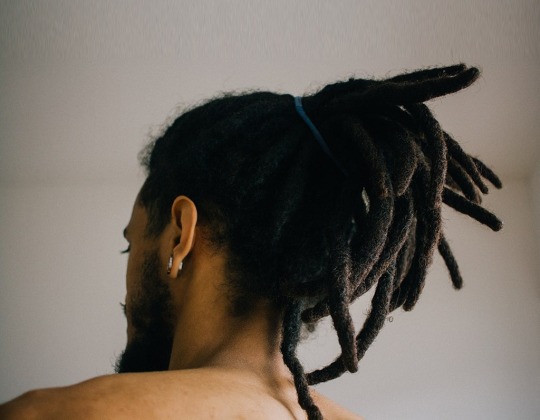
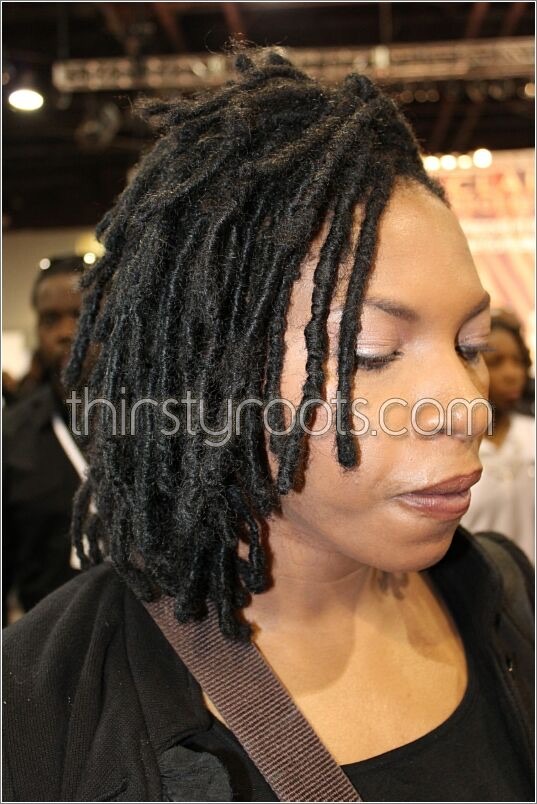


A white elf or person just wouldn’t have locs that look like this. And I wouldn’t complain if the locs depicted on the elf (or any other art depicting white people with locs) actually looked realistic to a white person’s locs. Cause the issue is not “white people can’t have locs”. It’s a hairstyle. It’s fine. The issue is how it’s represented. So taking the way the hair would usually look on a black person and sticking it on a white character, that’s the problem. That’s cultural appropriation. That’s claiming ownership of something that’s not yours.
The loc hairstyle is now so ingrained in pop culture and yet when people draw characters with locs, they’re almost never black. I’ve seen it time and time again. Our hair is cool but we’re not. This elf would have been fire as a black woman. But this artist and most non black artists won’t gravitate to making the character a person of color. It’s not the “norm” or the first thing that comes to mind as beautiful. But our hair is good enough apparently.


Finished piece.
I wanted to draw @sentate‘s Melpomene corset design from the Midnight Collection because it’s freaking gorgeous!! <3<3
461 notes
·
View notes
Text
On Poly Relationships in ILW
Ok, we keep getting this ask, and so I’m saying it once more for one final time: there will be no poly relationships in ILW.
We understand that a handful of you really want poly relationships, some of you have asked respectfully, and some of you have not. For those of you who have asked respectfully and respected our response, we have no issue with you and thank you for respecting us. For those of you who have been rude or dismissive, know you are not doing anything to convince us of your point.
Ultimately, our team has decided not to include any poly routes, and here’s why:
First of all, as we’ve stated multiple times before, adding poly routes would absolutely include more coding if we were to do it any degree of justice. We would have to write a whole additional route for every combination of people. This would include coding for each additional route. This is a lot of extra work for us, especially since we’re already juggling all the combinations of relationships from the previous two books.
Second, if you don’t want any acknowledgment of the relationship at all, just the opportunity to sleep with everyone (including two former best friends and a demi woman) without consequences, then that’s a route where Rowan wouldn’t be taking their potential partner(s) feelings into the equation, which is not healthy polyamory. This wouldn’t work with the characters we’ve created. If you’re sleeping with two former best friends, one of which has intense deeply ingrained trust issues, then they’re going to have a problem with it.
(This is the main reason we’ve included jealousy variants. Because our characters are purposefully written and well rounded people with likes and dislikes and emotions. They get emotional about things that hurt them, and this type of open relationship would hurt them)
Third, a poly relationship simply wouldn’t work with the characters we’ve created.
Amalia is demisexual, which means she needs to be emotionally invested in a person and the relationship before she can even experience sexual attraction. She would need to be emotionally invested in every person in the poly relationship, and that would take a lot of coding and a relationship route with her and each poly option. This is way too much for us to add.
Abel is a family man through and through which includes monogamy and kids and the whole nine. It’s a result of his culture and the way he was raised. And yes, there are poly Mexicans, but Abel is not one of them. The way his character has been created, family is his greatest desire and the most important thing in his life. His version of a family is what his parents had before they died. Monogamy, kids, a house, etc.
Lincoln has trust issues on trust issues, particularly where relationships are concerned, and it would take a lot for him to trust one person enough to date them, much less more than one. He likely wouldn’t be able to trust a poly relationship because he wouldn’t be able to trust that he was as important to each person as the other people in the relationship are to each other. This isn’t a statement on poly relationships, this is because Lincoln grew up in a complicated way and trusts almost no one: not his family, not his friends, no one.
For Jocelyn, like Lincoln, trust is a big issue. In addition to having trust issues, Jocelyn doesn’t like most people. She’s a very isolated person by design. She likes the people she likes and no one else. She doesn’t want to meet new people, or form new relationships. She has who she has and that’s it. That’s all she wants. If we were to add a poly route for her, then, as with Amalia, we would need to add a whole romance route for her and every single poly option. Jocelyn’s trust is hard to earn and is not given lightly. Therefore, it would need to be a well written route.
What this essentially boils down to is the fact that we’re not willing to compromise our characters or their relationships with each other for quick easy relationships. Our characters are complicated and important to us. We want to write them with respect, and to write a poly route with any of them would require a lot of time and work to do properly and respectfully.
If you want a book where you can be in an open relationship and no one gets jealous then you can play just about any other choices book.
Fourth, if you want a poly relationship in a game, then play a game that allows poly relationships. We’re not including it in ours. We’ve said it multiple times from the very beginning of this project (as in it was in our FAQ as far back as February 2021), we’ve explained our reasons, and we’re not including it. We’re just not.
Those who insist on sending us asks criticizing us or complaining about the lack poly relationships will be ignored. If you are rude you will be blocked. We are done talking about this.
We have already made our decision. You are not going to change our minds, you are just being disrespectful at this point. You are not obligated to like or even read our work, and in fact we encourage you to write your own stories. That's how this project started, after all.
We’re doing this for free out of the goodness of our hearts and are spending hundreds of hours on it. We are working around school, work, our own lives. We are putting our projects and our lives on hold to write this game, and we are writing it the way we are writing it. If you don’t like what we’ve written, then don’t play it. It’s that simple.
88 notes
·
View notes
Text
What I Would Change About the Ruin and Rising Ending
So this is separate from what I actually think would have been best for the story, in that Aleksander is the third amplifier and Alina is a tracker. Baghra never has her ridiculous plot twist info dump and Alina is actually allowed more agency and the ability to take initiative and the Darkling is actually written consistently from the start.
Here’s what I think should have happened in the ending if all the events leading up to it were the exact same:
Alina kills Mal and with the power of the three amplifiers kills the Darkling. As punishment for using all three amplifiers, she and the Darkling both lose the power of Merzost. This power is then used to fulfill Morozova’s aching loneliness, creating hundreds of shadow and sun summoners all across the world. The Darkling comes back to life through the loss of Merzost, and Mal comes back to life through the loss of his tracking abilities and status as an amplifier.
This ending feels not only more consistent with the themes LB tries to convey throughout the books, but it also aligns more with character arcs, established lore, and the parts of the plot that actually made sense.
The Darkling was punished for using Merzost by the Fold’s creation, which was a place where his powers were rendered useless (although the fact that he still has much power over the fold feels contradictory to this fact). He still retained the ability to use it, however, the result of only using some of the Merzost’s power. Alina was punished much more severely for not only using Merzost but also taking all three amplifiers. Therefore she is stripped of that power entirely. The Darkling, who she killed with the power and who has also lusted for power, is stripped of it as well.
Not only that, but the presence of hundreds of people like them now ensures they do not have more power than everybody else. It strips Alina and the Darkling of power without robbing them of a very important piece of their identity that should be impossible to take. By making it so that they now have hundreds of equals, that they have people to match them, challenge them, stop them. That they can no longer take more power, that they can no longer use their powers over those less powerful than them, that their greed does not destroy those around them. It makes them essentially powerless (consistent with the theme of punishment in regards to the Merzost), without removing their status as members of a persecuted and oppressed minority.
This remains consistent with Alina’s character arc as well. Her growth as a character, coming into her abilities and learning to accept every part of herself, instead of denying an essential piece of her identity because she’s trapped by the past and her prejudices and her fear of moving forward - because she’s also trapped by her low self esteem and her loneliness and her fear. By allowing her to remain as a Grisha, her developmental arc - of learning self esteem and self acceptance, of learning to love every part of herself and to not deny those parts of herself for others or because of her worries, of finding a community, growing into a woman outside of one person, learning to connect with others and love others and love herself and love her powers - isn’t regressed in any way. It isn’t negated.
There still remains a punishment for the Merzost and for her hunger for power. There still remains a way to acknowledge the thematic ties between loneliness and Grisha - especially Morozova’s loneliness and therefore Aleksander’s. There still remains the culmination of three books worth of seeking out amplifiers - a satisfying result of all her effort and her traumas; the powers she sought out to defeat the Darkling actually used to defeat him. There still remains the acknowledgement of Alina’s growth and change. She isn’t robbed of a valuable piece of her identity and her path of self fulfillment and self acceptance.
I won’t get into this much now, but I also think Alina’s reluctance to accept herself as Grisha, hurting herself to remain untested and weakening herself by denying that crucial part of her, is the result of centuries of the oppression and persecution of the Grisha as a people. It isn’t just her own fears, but also the way the world has forced Grisha to integrate into society. How the Grisha’s oppressors have treated them, not allowed them to truly develop or grow or gain power. The way they’re viewed by society and the prejudices against them as a whole that stifles their ability to truly connect or form a healthy community.
That part of Alina’s culture and birthright was denied her by her oppressors. She lived amongst these people for years and grew up with their customs, and when she finally discovered the part of herself that made her Grisha, she was introduced to her people. Her community that the world, through endless hunting of the Grisha and stripping them of agency, using them and othering them and ostracizing them from society, refused the ability to truly connect. She was allowed to finally realize herself and who she was born to be.
Her stay at the Little Palace was distressing in a lot of ways, but I’m not talking about just the Little Palace, I’m talking about her journey throughout the books as a whole, as she learns about the people and community she belongs to. As she grows to love it and accept it and take pride in it. Her culture and her people - the Grisha.
So when people say Alina losing her powers is good because she doesn’t want to be a part of the Grisha (even though she grows to love being Grisha, not wanting to was only in the beginning), and that she’s happier as an otkazat’sya because she grew up with them (the people who have oppressed her kind and smothered her powers), and that Grisha culture isn’t hers, I want to scream. The reason it wasn’t hers was because she was held back from it. Because Grisha oppression has become systematic and ingrained within society. Because prejudice against the Grisha runs deep.
To say that it's good that she’s stripped of what makes her Grisha because she was raised otkazat’sya? When if the Grisha were free she never would have been in the first place? To refuse to acknowledge the harm done to her people and therefore her, in creating a world so against Grisha that she was never given the chance to be raised in her own community? Amongst her own people? Who would understand her and would never have let her get sick by refusing to use her powers and who would have helped her because they know what it’s like to be Grisha - because they are Grisha.
That’s fucking bullshit.
Alina doesn’t hate her powers. Her powers don’t cause her pain. It’s others and the world that hurts her because of them. And this is an important distinction. Alina losing her powers isn’t a healthy message. That others hurting you for how you were born means that the only way to remain safe is to strip away the part that makes you different. That Alina returning to the people she was forced to assimilate with and that raised her to deny a massive part of her identity is a healthy thing-
That’s not a message that should ever be given. Which is why Alina should have kept her powers as the sun summoner, even if she loses the amplifiers.
And the burden of being the only sun summoner is lessened with the spread of her powers as well. People claim that Alina losing her powers was good for her because the world burdened her too much because of them, but that’s an issue easily solved by the splitting of her powers. She now isn’t the only one with a weight to carry because of the way she was born, and in fact she no longer has to carry it at all.
Additionally, Morozova’s amplifiers and the Merzost itself, which he created, being used to fulfill the loneliness he felt in the world and that all Grisha feel - that Aleksander especially suffered under (and which he suffered under in part due to Morozova), is a much more poetic and thematically consistent way to maintain equilibrium and fill the void of loneliness in the world than robbing Alina of her powers to do so. Which is just pointless and random and doesn’t align reasonably with any of the narrative elements. Morozova himself doing so through his amplifiers and the Merzost makes it a state of healing and even redemption. It ties his story and his character together with the plot and established themes.
It also keeps with the theme of balance. In that the Merzost is now gone and the amplifiers are now gone - abilities deemed to be unnatural and against the balance - and instead both of their powers are spread across the land. Not just Alina’s. Which was an unbalance and not in keeping with the themes established throughout the books. With both powers not only split but also split amongst many, real balance returns to the world.
I also think that both Mal and the Darkling coming back makes the ending more in line with the plot and all of the character’s arcs, and also more intriguing as a whole. Alina now has the opportunity to navigate her relationship with the both of them on new, uncertain ground.
I think this would be a unique start to a Darklina relationship in particular, as the Darkling now has many equals that are not Alina. So what would make him stay? A fun premise to explore in regards to both characters and their motivations.
On the other hand, Malina has to continue to grow with Alina still living as a Grisha sun-summoner, but now the pressure isn’t all on her. She’s free of the burden she was forced into, but not free of the powers which she came to love. She also hasn’t been stripped of her identity within a group of persecuted and marginalized people that she came to connect with.
Alina and Mal could very well live out their lives in peace. Or they could take a different path, with so many new avenues open before them. This could provide the opportunity for an even more complex future if the Darkling still remains involved with Alina (with them) even peripherally. Like if they still had dealings with him in some way, even if there isn’t anything romantic going on between him and Alina.
All in all, I just think it would be a better ending for all three of them in a variety of ways, and it also creates so many opportunities for different paths to be taken. It’s more consistent with the themes LB attempted to convey, the plot and character arcs as a whole, and the established lore.
#shadow and bone#sab#grishaverse#sab meta#this is just Thoughts#I spoke about it a bit before but I wanted to speak more#myramblings#aleksander morozova#the darkling#alina starkov#mal oretsev#darklina#malina#mymetas#sab salt#kind of#leigh bardugo#the grisha trilogy#grisha meta#darkling slander sunday#sab spoilers#ruin and rising spoilers#shadow and bone spoilers#rar spoilers#siege and storm spoilers#sas spoilers
137 notes
·
View notes
Note
please read this with an open mind, i tried to word this in a way that comes off correctly and kindly (im autistic so im bad with tone across text and i noticed with other anons you've been defensive and im just trying to come at this in a way that doesnt read hostile)
if butch & femme was just synonyms related to purely the presentation of masculinity and femininity everyone and anyone could claim the words butch or femme regardless of their gender, sexuality, ect - including non-queer people. butch and femme are ingrained in lesbian culture for reasons larger than just the performance of presenting masculine and feminine, and play a larger role in ones identity than just outward appearance. yes they are rooted in both of those things but - and i dont mean to come off wrong so please do not take this unkindly because i do not mean this so! - i think many lesbians misunderstand the use and culture of these words and their function in both the past and present. this is why that anon mentioned gnc femmes (which i am one actually!) and is why non-binary lesbians like me with disconnects from femininity due to the complexities related to sexuality (specifically the societal issues related to a lack of attraction to men) + gender identity can be femmes without being necessarily directly connected to femininity/performing femininity traditionally and instead in a gnc way.
again, it's not just butch = masc (or as a gender identity) and femme = fem (or as a gender identity), though that is the roots, there is far more to it and it is not fair to call us chronically online for trying to provide more information, i largely agree with a lot of things you say but this particularly was very hurtful to read from you - especially since you are a fellow femme. i know you are likely already aware as a femme - that people already misunderstand butch and femme as lesbian identities and that is all we are trying to combat :(
Thank you for writing this in a nice and respectful way. The only reason why I was defensive with the other person was because they didn’t do that. If you respect me I will respect you back, that’s how I always act.
I don’t think you understood me when I was talking about butch and femme still being rooted in masculinity and femininity respectively. I know butch and femme are not terms only related to being masculine or feminine, I even said that in another ask. I said they’re still rooted in masculinity (butch) and femininity (femme), saying that doesn’t mean I think they only serve as a description of being masculine or feminine.
I’ve said more than once that I know butch and femme are way more than just being masculine or feminine. I think you either didn’t see the posts where I said that or you completely misunderstood them. So when I was talking about chronically online people I was referring to people who completely ignore the fact that even though those terms are not only related to masculinity and femininity, they’re still rooted in that.
It would be so great if people simply asked before making assumptions about things I said 🫠 I really don’t mind you asking if you’re not sure about something I said.
5 notes
·
View notes
Text
The Queer Appeal of Sk8
Recently @mulberrymelancholy reblogged a post of mine with a truly galaxy brain take about how Sk8 “is a show made for queer fans” and generally how sports anime often depicts love and relationships in a way that’s more accessible and relatable to ace/arospec people than other mainstream media does.
Just, *chef’s kiss* fucking brilliant. I urge you to read their post here (note I’m referring to the reblog not the actual post).
And basically, it got me thinking about this concept of Sk8 as a Queer Show, and the kinds of stories and dynamics that tend to attract queer audiences in droves, regardless of whether its queerness is made explicit or hell, whether that queerness was intended.
And that’s what I’ve been pondering: What are the cues, markers, or coding, in Sk8 that set off the community’s collective gaydar?
I obviously can’t speak for the community. So here’s what aspects of the show intrigued me and what, for me, marks Sk8 as a Queer Show beyond the subtextual queer romances: a punk/alternative aesthetic, Found Family, Shadow as a drag persona, and The Hands.
1.) The Punk Aesthetic
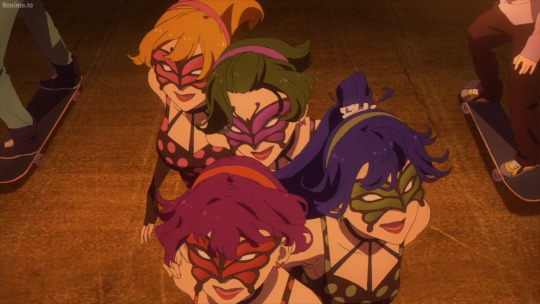
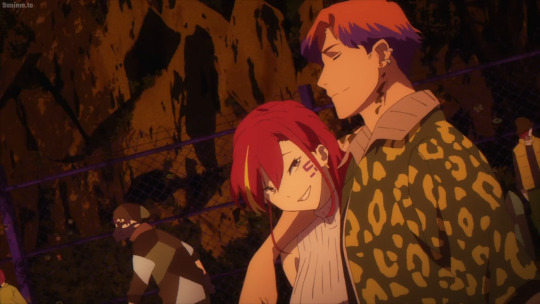
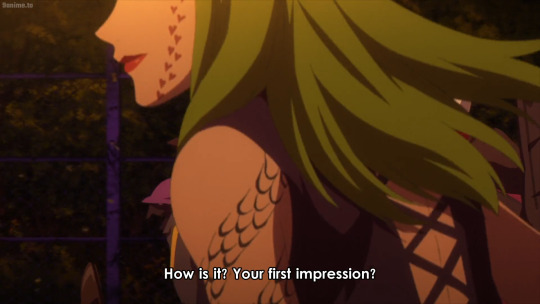
All three of the above screenshots are taken from Ep 1, and every single one of them depicts background characters. They’re nameless and ultimately unimportant characters, yet each of them designed so distinctly and so unique from one another, one could mistake each of them for the main character(s) of another story.
Of what little I know about Punk subculture, I do know this: that the ethos of Punk is heavily built around a celebration of individuality and non-conformity. Sk8 seems to have incorporated this ethos into the very fabric its worldbuilding, and the aesthetics and culture upon which it takes inspiration appeals specifically to a queer audience.
I don’t really need to explain why Punk has such deep ties with the queer community. For decades, queer people have found community and acceptance within punk spaces, and punk ideology is something that I think is just ingrained in the queer consciousness as both lived experience and a survival tactic.
Therefore, a show that adopts punk aesthetics is, by association, already paying homage to Queer culture, intentional or not.
Queer fans notice this- like recognizes like.
2.) Found Family
This also needs little explanation.
Too often, queer individuals cannot rely on their “born into” families for support and acceptance. Too often, we are abused, neglected, and abandoned by those who we were taught would “always be there for us.”
And so, a universal experience for queer people has been redefining the meaning of Family, having to build our families from scratch, finding brothers, sisters, mothers, and fathers in people with whom we have no blood relation, and forming communities tied together by shared lived experience rather than shared genetics.
And this idea of Found Family is also built into Sk8′s narrative.
Like, for example, the way that Reki promises MIYA that he and Langa will “never disappear from [his] sight,” filling the void that MIYA felt after his friends abandoned him.
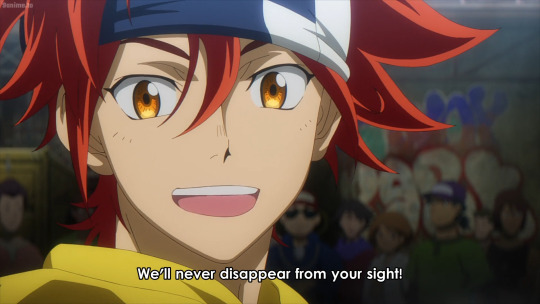
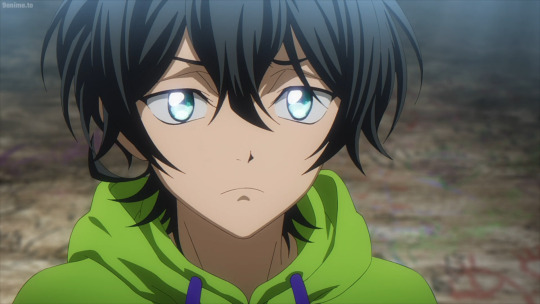
And in the way that JOE becomes a paternal figure for Reki, teaching him ways to improve in skateboarding, and ensuring that Reki doesn’t self isolate when he’s feeling insecure.
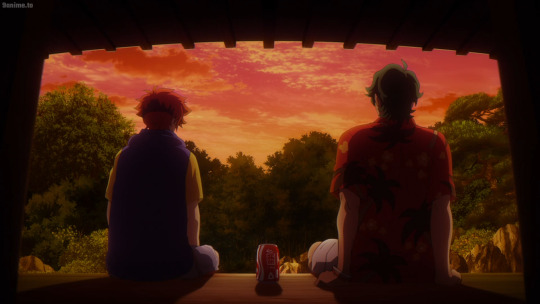
And in the whole Ep 6 business with Hiromi acting as babysitter to the Gang.
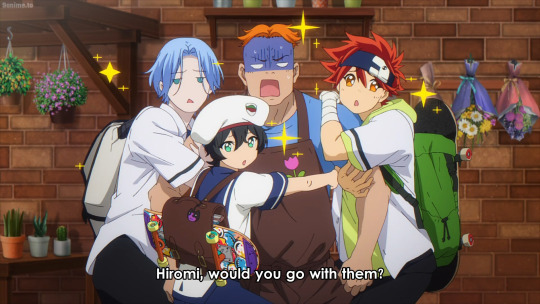
Hell, even ADAM (derogatory) is associated with this trope. Abused as a child, he finds solace in an underground skateboarding community and culture he helped create- his own found family (or some powertrippy version of it anyway).
Again, queer fans see themselves depicted in the show, but this time in the way that the show gives importance to Found Family relationships between its characters.
3.) Shadow and Drag
This is one that’s more of an association that I personally made. But I was intrigued by the way that Hiromi adopts his SHADOW persona. He wears SHADOW like a mask, and adopts a personality seemingly so opposite to his day-to-day behavior.
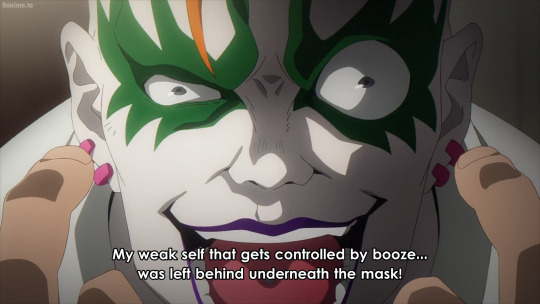
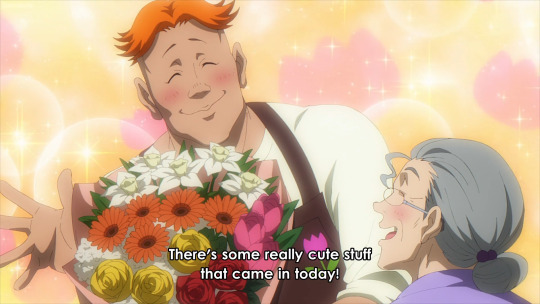
Further, the theatricality and general “gender fuckery” of his SHADOW persona, to me, just seemed so similar to a the characteristics of a drag persona (I don’t know a whole lot about drag but enough that I’m drawing superficial similarities).
There’s also this aspect of a “double life” that he, and actually all the other adult characters of the show, have to adopt, which is a way of living that I’m sure a lot of queer viewers see themselves reflected in.
4.) The Hands
Ohhhh the Hands.
One of the things I noticed very early on is the way the show constantly draws our attention to Reki’s hands, which I thought was a little strange for an anime about skating. After all, skating doesn’t really involve the hands, or at least the show doesn’t really draw attention to hands within the context of skating.
I count 3 times so far between Eps 1-9 in which hands are the focus of the frame.
First, when Reki teaches Langa how to fist pump after Langa lands his first ollie, second, when Reki and Langa make their Promise, and finally, when Langa saves Reki from falling off his board.
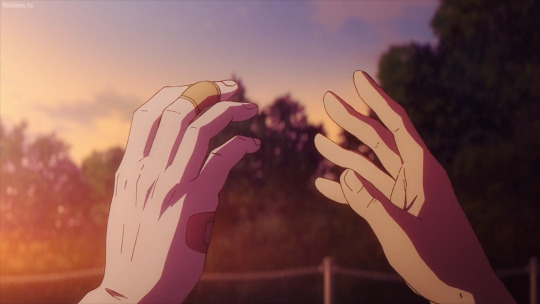
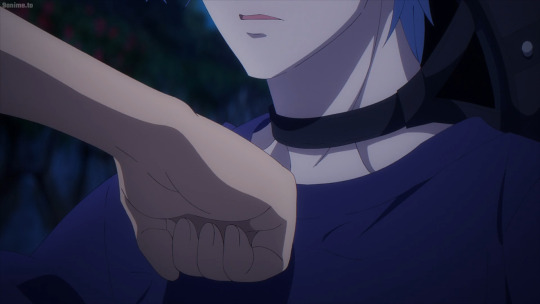
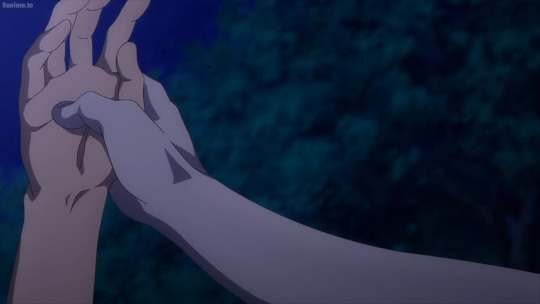
And you know what they say, twice is a coincidence but thrice is a motif (no one else actually says this I think I’m the only one who says this lol).
I’m not really certain why hands seem to be such a shared fixation among queer people (at least among those I interact with). All I know is that gay people are just fucking obsessed with them.
I have a Theory as to why, and at this point I’d love for other people to chime in and “compare notes” if you will, but I think it basically has to do with repression. And in the same way that queer people have had to redefine the meaning of family, we’ve also had to redefine intimacy.
Being overtly physically affectionate with someone of the same sex, even if they’re your significant other, or often specifically BECAUSE they’re your significant other, can still be dangerous, even now despite the “progression” of society. Queer people know this, this vigilant surveillance of our environment and ourselves, always asking ourselves, “Am I safe enough to be myself?”
Already, Western culture is pretty touch-averse. That is, it’s considered taboo to touch someone unless they’re a family member or a romantic partner. And to touch a person of the same sex in any way that could be misconstrued as romantic (which is most things tbh) is a big no no.
There’s just A Lot to unpack there.
But basically I think that queer people, by necessity, have had to learn to romanticize mundane or unconventional ways of being physically intimate so that we can continue to be romantic with one another without “being caught” so to speak.
Kissing and hugging is too obvious. But a handshake that lingers for just a second too long is much more likely to go unnoticed, braiding someone’s hair can easily be explained away as just lending a helping hand, touching palms to “compare hand sizes” is just good fun.
But for queer people, these brief and seemingly insignificant touches hold greater meaning, because it’s all we are allowed, and all we allow ourselves, to exchange with others.
God, I’ve gone off and rambled again. What’s my point? Basically that the way the show draws attention to Reki’s hands, and specifically how they’re so often framed with Langa’s hands, is one of the major reasons why I clocked Sk8 as a Queer. It’s just something that resonated with me and my own experience of queerness, and I know that I’m not the only one who noticed either.
~
So in conclusion, uhhhh yeah Sk8 the Infinity is just a super gay show, and it’s not even because of the homo-romantic subtext (that at this point is really just Text).
Because what’s important to understand is that Queerness isn’t just about same-sex romance.
Queer Love isn’t just shared between wives/girlfriends, husbands/boyfriends, and all their in-betweens. Queer Love can be two best friends who come out together, queer siblings who rely and support one another, a gay teacher who helps guide one of their questioning students, a queer community pitching in to help a struggling member.
And that all ties with another important thing to consider, that what we refer to as the “queer experience” or “queer culture” isn’t universal. In fact, it wrongly lumps together the unique experiences and struggles of queer BIPOC all under one umbrella that’s primary White and middle class.
So I think what drives a lot of my frustration about labeling a show like Sk8 as Queerbait is this very issue of considering queerness and queer representation within such narrow standards, and mandating that a show must pass a certain threshold of explicit queerness to be considered good representation.
I get that someone might only feel represented by an indisputable canonization of a same-sex couple. That’s fine. But labeling Sk8 as Queerbait for that reason alone ignores the vast array of other queer experiences.
The aspects of Sk8 that resonate most deeply with my own experiences of queerness is in the way that Reki and Langa share intimacy through skating (intricate rituals heyo). For me, them officially getting together ultimately doesn’t matter- I’ll consider Sk8 a Queer show regardless.
Similarly, @mulberrymelancholy finds ace/arospec representation in that very absence of an on-screen kiss. A bisexual man might find representation in Reki, not because he enters a canon relationship, but in the depiction of Reki’s coming of age, growing up and navigating adolescent relationships. A non-binary person might feel represented through CHERRY’s androgyny.
That’s the thing, I don’t know how this show will resonate with other members of the queer community, and it’d be wrong to make a judgement on Sk8′s queer representation based on my experiences alone.
That being said, Straight people definitely don’t get to judge Sk8 as Queerbait. Y’all can watch and enjoy the show, we WANT you to enjoy these kinds of shows, and we want you to share these shows and contribute to the normalization and celebration of these kinds of narratives.
But understand that you don’t have a right to tell us whether or not Sk8 has good or bad queer representation.
And even members of the queer community are on thin ice. Your experience of queerness is not universal. Listen to the other members of your community, and respect that what you might find lacking in this show may be the exact representation that someone else needs.
#and scene#i was up till 4am writing this instead of doing my hw#bc i hav Opinions dammit#sk8#sk8 the infinity#sk8 meta#sk8 theory#queerbait
301 notes
·
View notes
Text
Daniel LaRusso: A Queer Feminine Fairytale Analysis Part 1 of 3
Disclaimers and trigger warnings:
1. These fairytales are European, although there’s often overlap in themes globally. I know European fairytales better, which is essentially the reason I’m not going to branch out too far. I opted to also stick to Western movies so as not to narrow things down, but also in particular “waves hand towards all of Ghibli” amongst many others. There’s a reason the guys in Ghibli are so gender.
2. TW for discussions of rape culture and rape fantasies
EDIT: FUCK I’M A GOBLIN CHILD! FORGOT TO PUT A MASSIVE MASSIVE THANK YOU TO @mimsyaf WHO HAS BEEN THE NICEST, KINDEST EDITOR ON THESE THOUGHTS AND CONTRIBUTED SO MUCH TO THEM AND GENERALLY IS A WONDERFUL PERSON!
Part 2
Part 3
1. Introduction
I recently wrote a little thing, which was about Daniel as a fairytale protagonist – specifically one that goes through some of the kinds of transformations that are often associated with female protagonists of fairytales.
I used quotes from Red Riding Hood, Labyrinth, Buffy The Vampire Slayer, and Dracula, which, as an aside – the overlap between fairytales, horror, and fantasy and the ways each of those genres delve into very deep, basic questions of humanity and the world is something that will always make me feral. I will be generally sticking with fairytales though. Also I am very excited about some of those Labyrinth concepts going around!
I’m going to use “feminine” and “masculine” in both gendered (as in relating specifically to people) and non-gendered (as in relating to codes) ways throughout this, depending on context.
To be binary for a moment, because sample-sizes of other genders are low, women are usually able to fall into either feminine or masculine arcs, although sometimes the masculine-coded woman can become a “not like the other girls” stereotype and the feminine-coded woman a shallow cliché – in both cases they’re also under more scrutiny and judgement, so it’s always worth asking “is this character not working for me because of the writing or because I have ingrained biases? (Both?)”
Men don’t often get feminine-coded arcs. Because. Probably a mix of biases and bigotry. But there are some that seem to have slipped beneath the shuttered fence of “Sufficient Narrative Testosterone,” and Daniel LaRusso is one of them.
2. Some Dude Comparisons (Men Doing Manly Action-Hero Things like being trans symbolism and loving your girlfriend… seriously those things are hella manly, I wish we saw more of that onscreen…)
a. Neo
Much like Neo The Matrix, whose journey is filled with transgender subtext and specifically and repeatedly references Alice In Wonderland, Daniel doesn’t go through quite the kind of hero's journey usually associated with Yer Standard Male Hero, especially the type found in the 80s/90s.
Neo is my favourite comparison, because of the purposefulness of his journey as a trans narrative and the use of Alice. But I’m sure there are other non-traditional male heroes out there (but are they trans tho? Please tell me, I want trans action heroes).
Neo “passes” as a socially acceptable man, but online goes by a different name - the name he prefers to be known by - feels like there’s something inherently wrong about the world around him and his body’s place in that society, and then gets taken down the rabbit hole (with his consent, although without really “knowing” what he’s consenting to) to discover that it’s the world that’s wrong - not him. And by accessing this truth he can literally make his body do and become whatever he wants it to.
Yay. (The message of the Matrix is actually that trans people can fly).
Neo is – kind of like Daniel – a strange character for Very Cis Straight Guys to imprint on. He spends most of the first movie unsure about what’s going on, out of his depth, and often getting beaten up. He is compared to Alice several times and at the end he dies. He loses. He has to be woken up with true love’s kiss, in a fun little Sleeping Beauty/Snow White twist. Yes, after that he can fly, but before that he’s getting dead-named and hate-crimed by The Most Obvious Stand-In For Normativity, Agent Smith, and being carried by people far more physically capable than he is (people who also fall outside of normative existence).
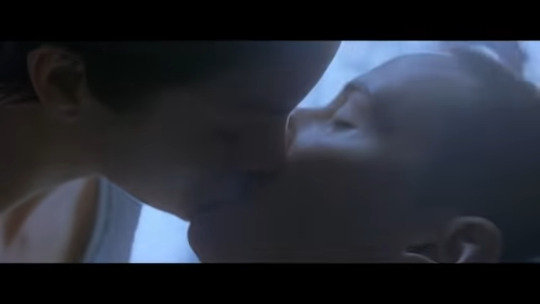
Trinity and Neo in The Matrix. The fact that a lot of the time neither of them is gendered is something. Literally brought to life by true love’s kiss.
I’m not about to argue that Daniel LaRusso is purposefully written along these same thought processes, so much as the luck of the way he was written, cast, directed, acted, and costumed all came together in the right way. And this is even more obvious when compared to That Other Underdog Fite Movie That Was By The Same Director as Karate Kid.
b. Rocky
The interesting thing about Rocky is that he is (despite being a male action icon) also not written as a Traditionally Masculine person. Large portions of Rocky – and subsequent Rocky films – are his fear and insecurity about fighting vs his inability to apply his skills to another piece of work and wanting to do right by his girlfriend (and future wife), Adrian. The fighting is most often pushed onto him against his will.
Much like in Karate Kid there is barely any fighting in Rocky I. Most of it is dedicated to how much Rocky loves Adrian and the two of them getting together. The fight is – again like in Karate Kid – a necessary violence, rather than a glorified one (within the plot, obviously watching any movie like this is also partly about the badassness of some element of the violence – whether stamina or the crane kick, it’s all about not backing down against a more powerful opponent).
Rocky is played by Sylvester Stallone. He’s tough, he’s already a fighter (albeit in the movie not a great one yet), he’s taking the fight for cash – so although he’s also soft-spoken and sweet, you’re aware of the fact that he’s got those traits that’d make a male audience go “Hell Yeah, A Man,” or whatever it is a male audience does watching movies like that… cis straight men imprinting on oiled muscle men sure is a strange phenomenon, why do you wanna watch a boxing match? So you can watch toned guys groaning and grappling with each other? Because you want to feel like A Man by allowing yourself to touch the skin of other men?
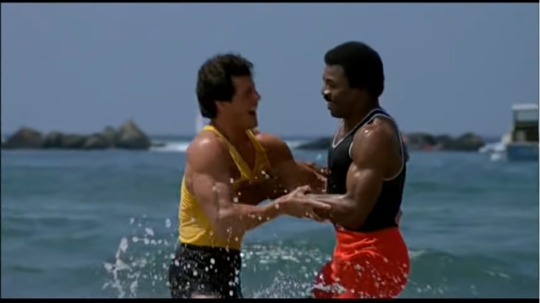
Apollo and Rocky in Rocky III. This sequence also includes prolonged shots of their crotches as they run. Sylvester Stallone directed this. This was intentional. Bros.
Daniel LaRusso is not built like that. But that doesn’t really have to matter. Being smallish and probably more likely to be described as “pretty” than handsome, and not having a toxic masculine bone in his body does not a feminine archetype make. It just makes a compelling (and pretty) underdog.
c. Daniel
So where does the main difference really lie? Between Rocky and Daniel? Well, Rocky has the plot in his hands – Daniel, largely, does not. Rocky is acting. Daniel is reacting or being pushed into situations by others. Just like our boy Neo. Just like Alice in Wonderland, Cinderella, Snow White – just like some of the women in some contemporary(ish) fairytale films like Buttercup (Princess Bride), Dorothy (Wizard of Oz), or Sarah (Labyrinth).
This isn’t a necessary negative about stories about girls and women, so much as looking at what it is girls and women in fairytales have/don’t have, what they want, and how they’re going to get it. It’s about power (lack of), sexuality (repressed, then liberated), men, and crossing some taboo lines. It’s also about queerness.
3. The Karate Kid Part One: Leaving Home
Daniel LaRusso is a poor, skinny, shortish kid (played by a skinny, shortish twenty-two-year old) who doesn’t fit in after having been taken away from the home he was familiar with against his will. Not every male protagonist in a fairytale leaves of his own will, and not every female protagonist leaves under duress – Red Riding Hood, for example, seems perfectly happy to enter the forest. However generally a hero is “striking out to make his fortune,” and generally a heroine is fleeing or making a bargain or being married off or waiting for help to arrive. She is often stuck (and even Red Riding Hood requires saving at some point).
Daniel then encounters a beautiful, lovely girl on the beach, puts on a red hoodie (red is significant), is beaten up by a large, attractive bully, loses what little clout he may have had with his new friends, and generally has a mostly miserable time until he befriends and is saved by Mr Miyagi. To do a little Cinderella comparison: Miyagi is the fairy godmother who pushes Daniel to go to the ball in disguise as well, and that disguise falls to pieces as he’s running away.
Then Daniel asks for help, Miyagi gets him enrolled in a Karate Tournament, and starts teaching him. Daniel wins the tournament and gets the girl, the end.
While Daniel has chutzpah and is a wonderful character, none of the big events are initiated by him, except for the initial going to the forest/beach (and within all of these events Daniel absolutely makes choices – I’m not saying he’s passive): Lucille takes them to California, Miyagi pushes him to go to the dance, Miyagi again decides to enroll him in the tournament and trains him, and only because Kreese doesn’t allow for any other option, Ali is the one who more often than not approaches Daniel, and even their first encounter is pushed by Daniel’s friends.
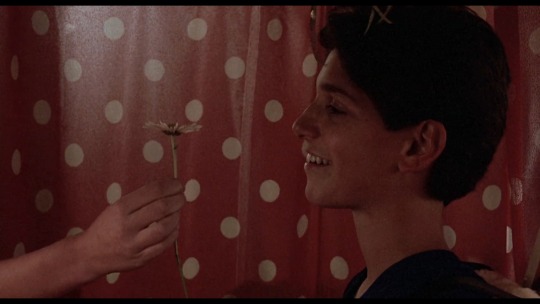
Daniel really is at a dance/ball in disguise and receives a flower from a girl who recognises him through said disguise, it’s unbearable! It’s adorable! I get it Ali, I fucking get it!
Daniel’s main journey within this – apart from not getting killed by karate thugs (love u Johnny <3) and kissing Ali – is to learn from Miyagi. He’s not necessarily a full-on feminine fairytale archetype at this point, although there are fun things to pull out of it, mainly in the context of later films and Cobra Kai: the subtext of karate and how that builds throughout all the stories, the red clothes, the themes of obsession, his being targeted by boys whose masculinity is more than a little bit toxic and based on shame… more on all that coming up.
He doesn’t technically get a home until they build him a room at Miyagi’s place, but he definitely leaves the woods at the end of this one, trophy lifted in the air after being handed to him by a tearful Johnny and all.
And then they made a sequel.
4. The Karate Kid Part Two: Not Out Of The Woods Yet
Daniel’s won the competition, Kreese chokes out Johnny for daring to lose and cry, more life-lessons are given (for man without forgiveness in heart…) and Daniel and Ali break-up off-screen, confirming that TKK1 was not really about the girl after all, which, despite Daniel and Kumiko having wonderful chemistry, is also an ongoing theme. Daniel enters the screen in The Most Baby-Blue Outfit seen since Tiana’s dress in Princess and the Frog? Or that dress in Enchanted? Maybe Cinderella’s (technically silver, but later depicted as blue)?
(Sidenote: At everyone who says Sam ought to wear a callback to that suit, you are correct and sexy).
Surprise, Miyagi’s building him a room.
Double-surprise, Miyagi needs to go to Okinawa.
Triple surprise, Daniel reveals he’s going with him, because he’s his son dammit.
The Karate Kid Part Two is maybe the least Daniel-LaRusso-Feminine-Fairytale-Protagonist of the three, because it’s not really his movie. Daniel runs around with Kumiko (aka the most beautiful girl I’ve ever seen), continues to be The Best Non-Toxic Boy a middle-aged Okinawan karate master could ask for, lands himself another Built Karate Rival (twice is just a coincidence, right? Right?), and eventually doesn’t die while wearing red again – twice: When Chozen almost strangles him to death at the Miyagi dojo and then during the final fight. The Saving Of The Girl (both the little girl in the storm and Kumiko) actually puts him in a more traditional masculine space than the previous movie did, even if the main theme of the film is about compassion and kindness and by the end, once more the boy whose masculinity is built on rockhard abs and matchsticks is on his knees. Daniel just has that power over big boys. It’s called kick/punch them in the face hard enough that they see stars.
There’s an aside to be made here about how much Daniel really is an observer in other peoples stories in this, although he is the factor that sends both Chozen and Kumiko into completely different directions in life (Chozen and Kumiko main characters when?) Anyway he comes out of it presumably okay, despite being almost killed. Maybe a few therapy sessions and he’ll get over it. Too bad Terry Silver is lurking around the corner…
5. The Karate Kid Part Three: The Big Bad Wolf
Alright people have written Words about the third movie. It’s fascinating. It’s odd. It’s eye-straining. It’s like olives – you’re either fully onboard the madness or it’s too off-putting for you (or you’re like. Eh, don’t see what all the fuss is about either way...). It’s basically a non-consensual secret BDSM relationship between a guy in his thirties (played by a Very Tall twenty-seven year old Thomas Ian Griffith) and a 17/18 year old (played by a shorter twenty-eight year old Ralph Macchio).
Also recently we got more information on Mr. Griffith’s input on the uh… vibes of the film. Apparently it wasn’t just The Sweetness of Ralph Macchio’s face, the screenplay (whatever that amounted to in the first place – release the script!), the soundtrack, the direction to not tone it down under any circumstances, the fact that Macchio categorically refused to play a romance between himself and an actress who was sixteen, no: it was also TIG coming up with fun ways to torture Daniel’s character and suggesting these to the director. Clearly everyone has fun hurting Mr Macchio (including Mr Macchio).
The point is that aaallll of that amounts to that Intense Homoerotic Dubiously-Consented-To D/s subtext that haunts the movie and gives a lot of fun stuff to play with. It’s also a film that – if we’re analysing Daniel along feminine-coded fairytale lines recontextualises his role in this universe.
The Fairytale goes topsy-turvy. Through the looking glass. Enter Big Bad Wolf stage right. Karate is a metaphor for Daniel’s bisexual awakening.
“Oh, when will an attractive man touch me in ways that aren’t about hurting me?” he asks after two movies of being hurt by boys with rippling muscles. “Why do men continue to notice me only to hit me? Do you think wearing red is making me too noticeable? Anyway, Mr Silver looked really good in his gi today.”
Daniel’s diary must be a trip.
#daniel larusso#the karate kid#cobra kai#ck#johnny lawrence#cobra kai meta#my writing#part one of three#some comparisons to matrix and rocky because I love to talk about those#terry silver
94 notes
·
View notes
Text
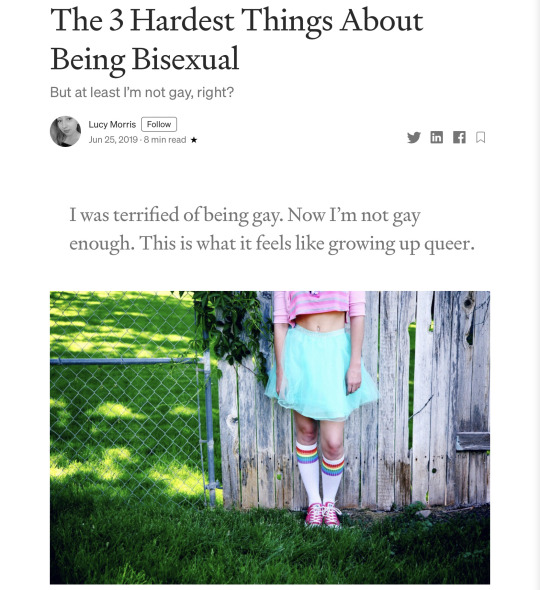
“QUEER”
First of all, let’s clear up a common misconception. Queer does not just mean gay. It’s an umbrella term for an identity which deviates from society’s perceived norm: heterosexual, or straight. Queer can refer to sexualities — gay, bisexual, pansexual, — or it can refer to being gender-queer; i.e, any label that deviates from the perceived gender norm: the binaries, male and female.
“Queer” is a reclaimed slur.
If you do not fall under the umbrella of queerness, it is safe to assume that you cannot use it. At all.
I am bisexual.
This means I experience attraction to plural genders. Pansexual also works fine. For the difference between bisexual and pansexual — see here:
Being bisexual isn’t easy. I went through similar hardships to gay women: I experienced attraction to women and was scared of what this meant for me, in such an oppressively homophobic society.
I am not saying being bisexual is harder than being gay, nor the inverse. But my experiences are distinctly bisexual, not gay.
Without further ado, here are the 3 things I’ve found to be the hardest about being queer, but not gay (enough).
#1: Finding My Place
Or, not being queer enough
I always knew I wasn’t straight, but I didn’t know what I was. Up until recently, I was still questioning. This didn’t feel enough to join groups or conversations with LGBT+ folk, let alone go to pride. Was I even LGBT if I was never L, G, B, or T?
I am still yet to attend a pride, even though I identify (fairly confidently) as bisexual. I am in a relationship with a man. This is (problematically) known as a “straight-passing relationship” and makes me feel even more undeserving of a place at pride.
This has been upsetting to me at times. But for others, it can be outright devastating. Growing up and needing support, but feeling like you’re ‘not gay enough’ to ask for it? So many young people are being left alone and afraid. Finding others like you is vital to figuring out who you are. Likewise, finding spaces which are safe and inclusive is vital for anyone, regardless of their sexuality or gender identity. A friend of mine happens to be a transgender man, and he summed up the issue perfectly:
“One thing that I keep noticing is how all hangout spots are “gay bars”, or (far less common) “lesbian bars”. I’m a straight man, so I don’t feel like I’m supposed to be there, but hanging out at regular bars is still too much of a gamble, so I don’t really have anywhere to go.”
It goes without saying that gay folk aren’t always safe in these spaces, as seen by the homophobic attack on the Pulse nightclub in Orlando, in 2016. Bigotry hurts the entire LGBT+ community. Bigotry doesn’t stop to ask whether you identify as gay or otherwise queer before it pulls the trigger.
But the LGBT+ community itself is much more welcoming to those who “pick a side” and just come out as gay, already. The infighting is inexplicable when one looks to attacks such as that in Orlando: bigots don’t care which letter you are in the acronym. So why does gatekeeping exist when we need to be strong in the face of intolerance when fragmentation only makes us weaker? Who are we helping by continuing to exclude identities from the discussion?
#2: Myths and Misconceptions
Well, it stands to reason that if bisexuals are what they seem in TV and movies, why would anyone want to make them feel included? They’re “greedy” and inauthentic. They’re attention-seeking, not to mention their propensity for threesomes. Now, I haven’t been in a wild orgy yet, but it seems like it will only be a matter of time before I follow my natural path.
Straight men, in particular, need to own up to their assumption that bisexual women are down for a threesome. The thing is, we are. But not with you, you big ASSUMER.
Infidelity
All jokes aside, the stereotyping of bisexuals is not only hurtful, but leads to difficulties finding and maintaining relationships.
As I came to terms with my bisexuality, I also had to accept that I might never be fully trusted by my partner, regardless of their gender or sexuality. I was shocked when my partner reacted to my coming out with the equivalent of a shrug — so much so, that I burst into tears of gratitude that my soul-bearing moment hadn’t been met with slut-shaming or assumptions of disloyalty. Nothing has changed. If anything, our bond is even stronger for me having been more authentic after coming out.
But cruelty came from elsewhere: when I came out, I was told that my partner was to be pitied, either because I’m gay and in denial, or bound to cheat on him. The main consequence of such attitudes has been the crippling fear of coming out to my partner. It saddens me that I felt so relieved when he accepted me for being who I am, and loving him just the same as I always have.
This outcome is not the case for many couples, with straight folk worried that their bisexual partner will realise they’re gay and just leave them. This fear of abandonment comes from a place of ignorance. When the media presents bisexuality as a steppingstone on the way to “picking a team”, it’s no wonder that people struggle to trust their queer partners.
Other Queer Myths
The myth that all trans folk medically transition invalidates those who choose not to do so, and let’s not forget the ignorant jeers that it's all just a mental illness. Asexual folk battle the stereotype that they can never have a relationship and shall forever remain a virgin (because what an awful thing that would be, right?) And pansexuals… well, at the lighter end, they’re asked if they have sex with cooking utensils. But often, they’re erased as irrelevant because “we already have the label bisexual”.
This brings us onto the third and final difficulty that comes with queer folk who aren’t easily categorizable as gay: erasure.
#3: Erasure
Erasure refers to the denial of an identity’s existence or its validity as a label.
Non-binary folk face ongoing and loud claims that they simply do not exist. This is despite the historical and scientific evidence to the contrary. Plus, the most important evidence — them, existing. Asexual folk are told they simply have not found the right person yet, or that they are just afraid of sex. Demi-sexual folk are told “everyone feels like that, unless they’re just sleeping around!”. And bisexuals are dismissed as simply being in denial that they’re gay.
Monosexuality & The Gender Binary
Our culture is so built on monosexuality (being solely attracted to one gender — for instance, gay or straight). Monosexuality is reinforced through everything from marriage to dating apps, the media to what we teach in schools. People cannot fathom that someone might want to experience more than one gender in their lifetime.
The binary models of sex and gender are also deeply ingrained. These rigid belief systems combined are to blame for our inability to accept that bisexuals do not need to “pick a side”. I was paralysed by fear for 17 years because I found girls attractive and that might mean I’m gay, because bisexuals are just gays who haven’t realised they’re gay yet.
Bierasure
Bierasure is dangerous, firstly because it leads a child to have to internalise both biphobia and homophobia. For instance, I had to work through being taught to hate gayness, whilst being taught that any attraction to non-male genders made me gay.
Women were cute, and so I was gay, and this meant I was disgusting.
My own mother told me this. She also told me that something has “gone wrong in the womb” for a child to be gay. (Well, Mum, I’ve got some bad news about your womb!)And she, like any bigot, extended this theory to anyone who experiences same-sex attractions — anyone queer. This is another reason why bi-erasure is perilous. Whether you’re a gay, cis-male or a demi-bisexual, trans woman… if your parents will kick you out for being gay, they will likely kick you out for being any sort of queer.
If we deny the bigotry that bisexuals undergo, we will continue to suffer. It won’t just go away. It will fester, with bisexuals having no one they can go to who believes them. And thus:
Erasure Kills
Bullying and suicide rates of queer-but-not-gay people continue to sky-rocket. We must direct funding, support and compassion to every queer individual, as they are all vulnerable to discrimination and bullying. The problem is being left to fester. This is in part because bigots treat all queer labels as just ‘gay’, deeming them equally unworthy. This is how far erasure can go.
Conclusion
Earlier on, I stated that my experiences are distinctly bisexual. The same applies to any queer identity.
Emphasising our differing paths and struggles is important to avoid the aforementioned erasure of already less visible groups. But this does not mean that the LGBT+ community should be fragmented by these differences.
If we can unite in our hope to live authentically and love freely, we will be stronger against bigotry. We are fighting enough intolerance from without: there is no need to create more from within.
So out of everything, what’s the hardest part about being bisexual?
It’s the fact that nobody knows it’s this hard.
#bisexuality#bisexuality is valid#bi tumblr#support bisexuality#bi#bi pride#pride#lgbtq pride#lgbtq#lgbtq community#bisexual education#bisexual youth#bi youth#support bisexual people#respect bisexual people#bisexual representation#bisexual injustice#bisexual equality#bisexual erasure#bi erasure#bisexual community#bisexual#bisexual facts#bisexual info#bisexual tips#queer#bisexual rights
346 notes
·
View notes
Note
Read your excellent addition to the post about Soviet brand of socialism and propaganda cutting both ways, and as someone who was actually born and lived in USSR until I was 15 (I'm old :)) - just, so much *yes*. Everything that you said is absolutely correct, even if it's not the most popular knowledge among the leftists / the younger people. Thank you!
Aha, thanks very much for the support. I hesitated to make the post, both because I usually try to stay in my own lane and because I know that unsolicited comments/additions to your posts are deeply annoying. But also, I do periodically put on my joyless pedant historian hat and say things, and... yes, here we are.
I'm not speaking from personal experience, but I do work on modern Eastern European and Russian/Soviet history, likewise have a close friend from the former USSR, and am writing a historical fic set in the 1980s Soviet Union, so it's something that I am decently familiar with. Likewise, words have meaning, history matters even when (especially when) it goes against popular mindsets, and you can't refute one side of propaganda by accepting the other side.
I know the youngins on tumblr see socialism as a cool and popular and desirable thing, and obviously yes, in its modern Western incarnation, it has a different meaning and set of political goals which are largely admirable. But as you don't need me to tell you, that doesn't erase the truly terrible legacy of twentieth-century old-school socialist dictatorships, and we can rightfully critique capitalism without giving into the simplistic zero-sum mindset of "if it's bad than the other side is good." Not least because if modern leftists simply ignore this legacy and don't try to deconstruct the ingrained American cultural mistrust of the term "socialism" and understand why it is difficult, they're never going to get anyone to accept their new version. Likewise, the way they insist on describing their platform as "socialism" is never gonna help them, and they have to learn how to deal with complicated reality in many ways, if they want any hope of making actual change.
Anyway. Yes. Thanks. :)
24 notes
·
View notes
Note
So, I don't think I've ever asked you this... what IS the whole point of the Spider-Sense? It really seems like something that only exists for writers to ignore or work around when they want to inject Legit Tension into a story.
I’ve thought about this power so much, but never with an eye to defend its right to exist, so I needed to think about this. The results could be more concise.
Ironically, given the question, I have to say its main purpose is to ramp up tension. But it’s also a highly variable multitool that a skilled creative team can use for...pretty much anything. It does everything the writer wants it to, while for its wielder always falls just short of doing enough.
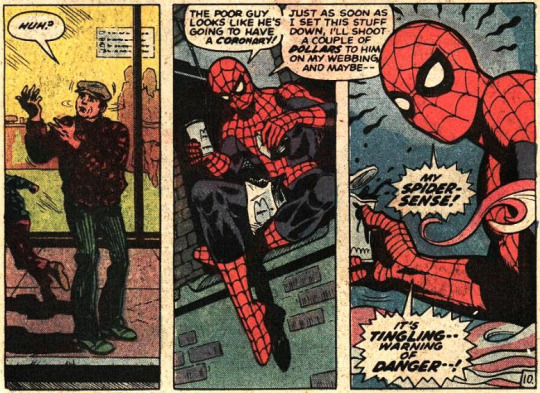
I went looking through my photos for a really generic, classic-looking example to use as an image to head this topic, but then I ran into the time Peter absolutely did not reimburse this man for his stolen McDonald’s, so have that instead.
A Scare Chord, But You Can Draw It
That one post that says the spider-sense is just super-anxiety isn’t, like, wrong. It’s a very anxious, dramatic storytelling tool originally designed for a very anxious, dramatic protagonist. I find it speaks to the overall tone of the franchise that some characters are functionally psychics, but with a psychic ability that only points out problems.
Spidey sense pinging? There’s danger, be stressed! Broken? Now the lead won’t even KNOW when there’s a problem, scary! Single character is immune to it? That’s an invisible knife in the dark oh my god what the fuck what the fU--
Like its counterpart in garden variety anxiety, the only time the spider-sense reduces tension is in the middle of a crisis. But in the wish fulfillmenty way that you want in an adventure story to justify exaggerated action sequences, the same way enhanced strength or durability does. Also like those, it would theoretically make someone much safer to have it, but it exists in the story to let your character navigate into and weather more dangerous situations.
For its basic role in a story, a danger sense is a snappy way to rile up both the reader and the protagonist that doesn’t offer much information beyond that it’s time to sit smart because shit is about to go down.
Spidey comic canon is all over the board in quality and genre, and it started needing to subvert its formulas before the creators got a handle on what those formulas even were, and basically no one has read anything approaching most of it at this point, so for consistent examples of a really bare bones use of this power in storytelling, I’d point to the property that’s done the best job yet of boiling down the mechanics of Spider-Man to their absolute most basic essentials for adaptation to a compelling monster of the week TV series.
Or as you probably know it, Danny Phantom. DON’T BOO, I’M RIGHT.
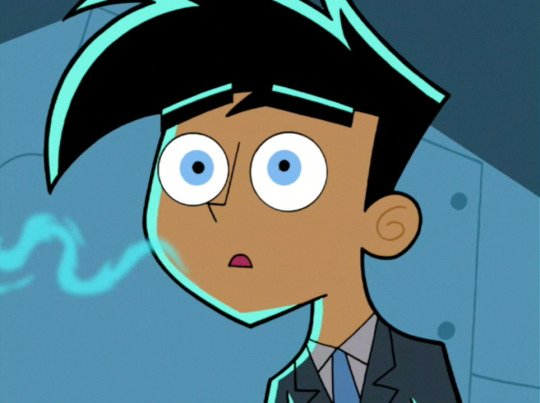
DP is Spider-Man with about 2/3 of the serial numbers filed off and no death (ironically), and Danny’s ghost sense is the most proof in the formula example of what the spidey sense is for: It’s a big sign held up for the viewer that says, “Something is wrong! Pay attention!” Effectively a visual scare chord. It’s about That Drama. And it works, which won it a consistent place in the show’s formula. We’re talking several times an episode here.
So why does it work?
It’s a little counterintuitive, but it’s strong storytelling to tell your audience that something bad is going to happen before it does. A vague, punchy spoiler transforms the ignorant calm before a conflict into a tense moment of anticipation. ...And it makes sure people don’t fail to absorb the beginning of said conflict because they weren’t prepared to shift gears when the scene did. Shock is a valuable tool, too, but treating it like a staple is how you burn out your audience instead of keeping them engaged. Not to go after an easy target, but you need to know how to manage your audience’s alarm if you don’t want to end up like Game of Thrones.
The limits of the spider-sense also keep you on your toes when handled by a smart writer. It tells Peter (everyone’s is a little different, so I’m going to cite the og) about threats to his person, but it doesn’t elaborate with any details when it’s not already obvious why, what kind, and from what. And it doesn’t warn him about anything else-- Which is a pretty critical gap when you zoom out and look at his hero career’s successes and failures and conclude that it’s definitely why he’s lived as long as he has acting the way he does, but was useless as he failed to save a string of people he’d have much rather had live on than him.
(Any long-running superhero mythos has these incidents, but with Peter they’re important to the core themes.)
And since this power is by plot for plot (or because it’s roughly agreed it only really blares about threats that check at least two boxes of being major, immediate, or physical), it always kicks in enough to register when the danger is bearing down...when it’s too late to actually do anything about it if “anything” is a more complex action than “dodge”.
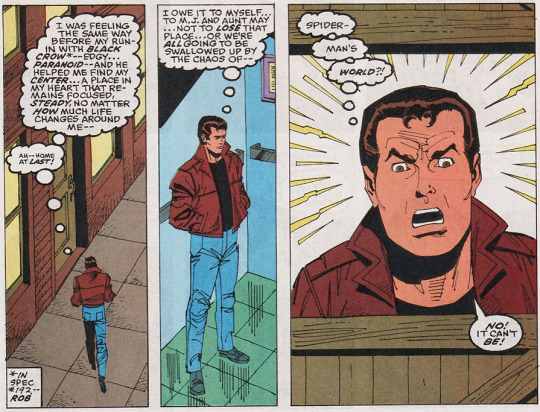
Really? Not until the elevator doors started to open?
That Distinctive, Crunchy Spider Flavor
The spider-sense and its little pen squiggles go hand in hand with wallcrawling (and its unique and instantly identifiable associated body language) to make the Spider-Person powerset enduringly iconic and elevate characters with it from being generic mid-level super-bricks. Visually, but also in how it shapes the story.
I said it can share a narrative role with super strength. But when you end a fight and go home, super strength continues to make your character feel powerful, probably safer than they’d be otherwise, maybe dangerous.
The spider-sense just keeps blaring, “Something’s wrong! Something’s wrong! God, why aren’t you doing something about this!?”
Pretty morose thing to live with, for a safety net! Kind of a double edged sword you have there! Could be constantly being hyperattuned to problems would prime you for a negative outlook on life. Kind of seems like a power that would make it impossible for a moral person to take a day off, leading them into a beleaguered and resentful yet dutiful attitude about the whole superhero gig! Might build up to some of the core traits of this mythos, maybe! Might lead to a lot of fifteen minute retirement stories, or something. Might even be a built in ‘great responsibility’ alarm that gets you a main character who as a rule is not going to stop fighting until he physically cannot fight anymore.

Certainly not apropos of anything, just throwing this short lived barely-a-joke tagline up for fun.
One of my personal favorite things about stories with superpowers is keeping in mind how they cause the people who have them to act in unusual ways outside of fights, so when you tell me that these people have an entire extra sense that tells them when the gas in their house is leaking through a barely useful hot/cold warning system that never turns off, I’m like, eyes emojis, popcorn out, notebook open, listening intently, spectacles on, the whole deal.
It also contributes to Peter Parker’s personality in a way I really enjoy: It allows him to act like an irrational maniac. When you know exactly when a situation becomes dangerous and how much, normal levels of caution go out the window and absolutely nothing you do makes sense from an exterior standpoint anymore. That’s the good shit. I would like to see more exploration of how the non-Parker characters experiencing the world in this incredibly altered way bounce in response.
It’s also one of many tools in this franchise hauling the reader into relating more closely with the main character. The backbone of classic Spidey is probably being in on secrets only Peter and the reader know which completely reframe how one views the situation on the page. It’s just a big irony mine for the whole first decade. A convenient way to inform the reader and the lead that something is bad news that’s not perceivable to any other characters is youth-with-a-big-exciting-secret catnip.
Another point for tension, there, in that being aware of danger is not synonymous with being able to act on it. If there’s no visible reason for you to be acting strange, well...you’re just going to have to sit tight and sweat, aren’t you? Some gratuitous head wiggles never hurt when setting up that type of conflict.
Have I mentioned that they look cool? Simultaneously punchy and distinctive, with a respectable amount of leeway for artists to get creative with and still coming up with something easily recognizable? And pretty easy to intuit the meaning of even without the long-winded explanations common in the days when people wrote comics with the intent that someone could come in cold on any random issue and follow along okay, I think, although the mechanic has been deeply ingrained in popular culture for so long that I can’t really say for sure.
It was also useful back in the day when no artists drew the eyes on the Spider-Man mask as emoting and were conveying the lead’s expressions entirely through body language and panel composition. If you wiggle enough squiggles, you don’t need eyebrows.
Take This Handwave and Never Ask Me a Logistical Question Again
This ability patches plot holes faster than people can pick them open AND it can act as an excuse to get any plot rolling you can think of if paired with one meddling protagonist who doesn’t know how to mind their own business. Buy it now for only $19.99 (in four installments; that’s four installments of $19.99).
Why can a teenager win a six on one fight against other superhumans? Well, the spider-sense is the ultimate edge in combat, duh.
Why can Peter websling? Why doesn’t everyone websling? Well, the spider-sense is keeping him from eating flagpole when he violently flings himself across New York in a way neither man nor spider was ever meant to move.
How are we supposed to get him involved with the plot this week???? Well, that crate FELT dangerous, so he’s going to investigate it. Oh, dip, it was full of guns and radioactive snakes! Probably shouldn’t have opened that!
Yeah, okay, but why isn’t it fixing everything, then? Isn’t it supposed to be why Peter has never accidentally unmasked in front of somebody? ('Nother entry for this section, take a shot.) That’s crazy sensitive! How does he still have any problems!? Is everything bad that’s ever happened to characters with this powerset bad writing!? --Listen, I think as people with uncanny senses that can tell us whether we are in danger with accuracy that varies from incredible to approximate (I am talking about the five senses that most people have), we should all know better than to underestimate our ability to tune them out or interpret them wrong and fuck ourselves up anyway. I honestly find this part completely realistic.
*SLAPS ROOF OF SPIDER-SENSE* YOU CAN FIT SO MANY STORIES IN THIS THING
The spider-sense is a clean branch into...whatever. There is the exact right balance of structure and wishy-washiness to build off of. A sample selection of whatevers that have been built:
It’s sci-fi and spy gadgets when Peter builds technology that can interface with it.
It’s quasi-mystical when Kaine and Annie-May get stronger versions of it that give them literal psychic visions, or when you want to get mythological and start talking about all the spider-characters being part of a grand web of fate.
Kaine loses his and it becomes symbolic of a future newly unbound by constraints, entangled thematically with the improved physical health he picked up at the same time -- a loss presented as a gain.

Peter loses his and almost dies 782 times in one afternoon because that didn’t make the people he provoked when he had it stop trying to kill him, and also because he isn’t about to start “””taking the subway’’””’ “‘’“”to work”””’’” like some kind of loser who doesn’t get a heads up when he’s about to hit a pigeon at 50mph.
Peter’s starts tuning into his wife’s anxiety and it’s a tool in a relationship study.
It starts pinging whenever Peter’s near his boss who’s secretly been replaced by a shapeshifter and he IGNORES IT because his boss is enough of an asshole that that doesn’t strike him as weird; now it’s a comedy/irony tool.
Into the Spider-Verse made it this beautiful poetic thing connecting all the spider-heroes in the multiverse and stacked up a story on it about instant connection, loss, and incredibly unlikely strangers becoming a found family. It was also aesthetic as FUCK. Remember the scene where Miles just hears barely intelligible whispering that’s all lines people say later in the film and then his own voice very clearly says “look out” and then the room explodes?? Fuck!!!!
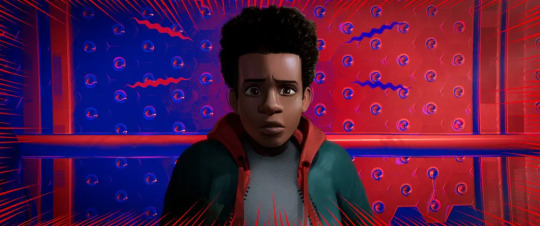
Venom becomes immune to it after hitchhiking to Earth in Peter’s bone juice and it makes him a unique threat while telling a more-homoerotic-than-I-assume-was-originally-intended story about violation and how close relationships can be dangerous when they go sour.
It doesn’t work on people you trust for maximum soap opera energy. Love the innate tragedy of this feature coming up.
IN CONCLUSION I don’t have much patience for writers who don’t take advantage of it, never mind feel they need to write around it.
#spiderman#peter parker#spiderverse#spidey#marvel#danny phantom#one day you'll see what i'm doing with it in the project i'm collabing on w/ my brother and then you'll all be sorry and hopefully impresse#mirrorfalls#asks answered#essays
1K notes
·
View notes